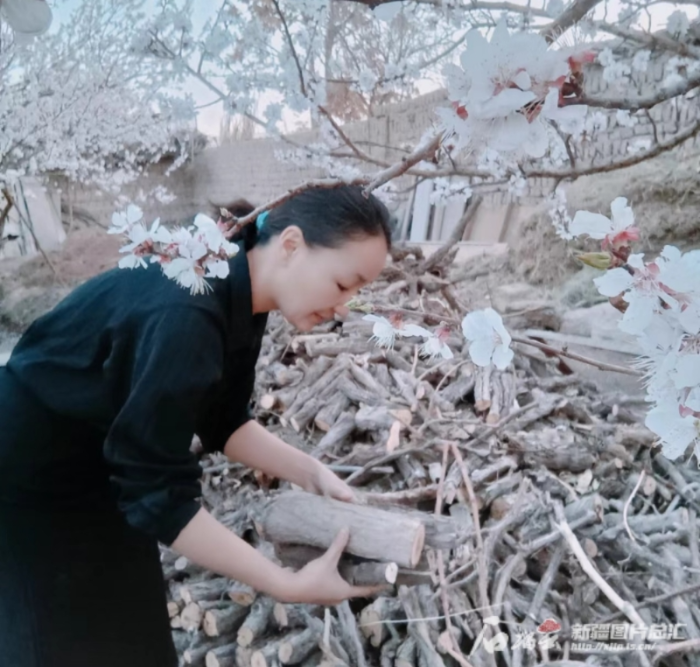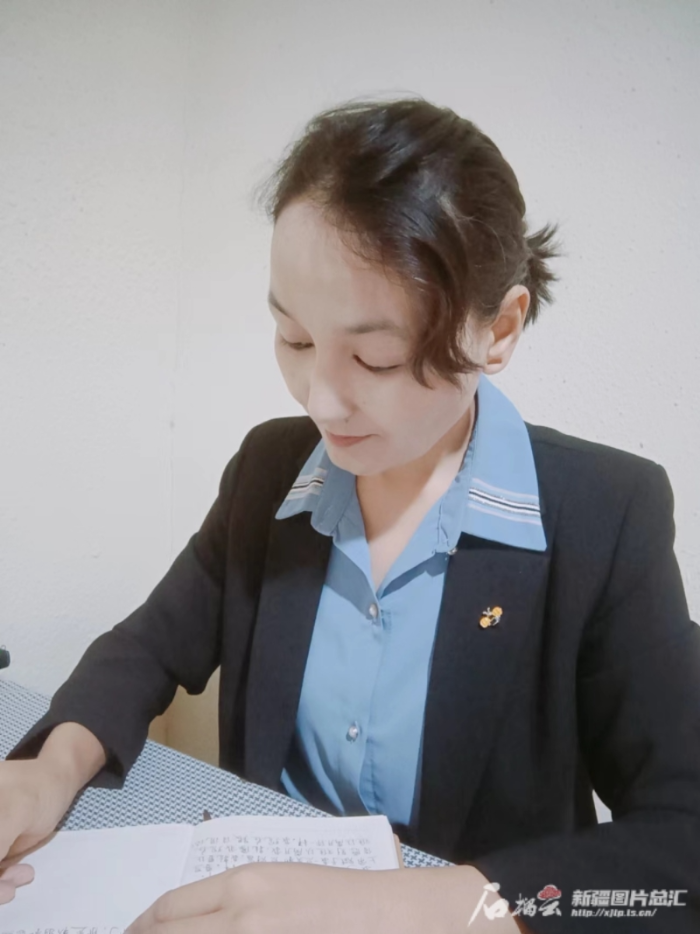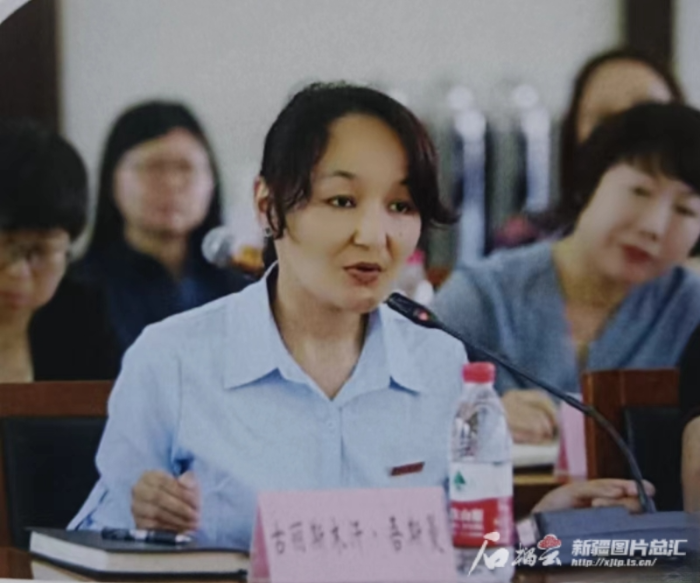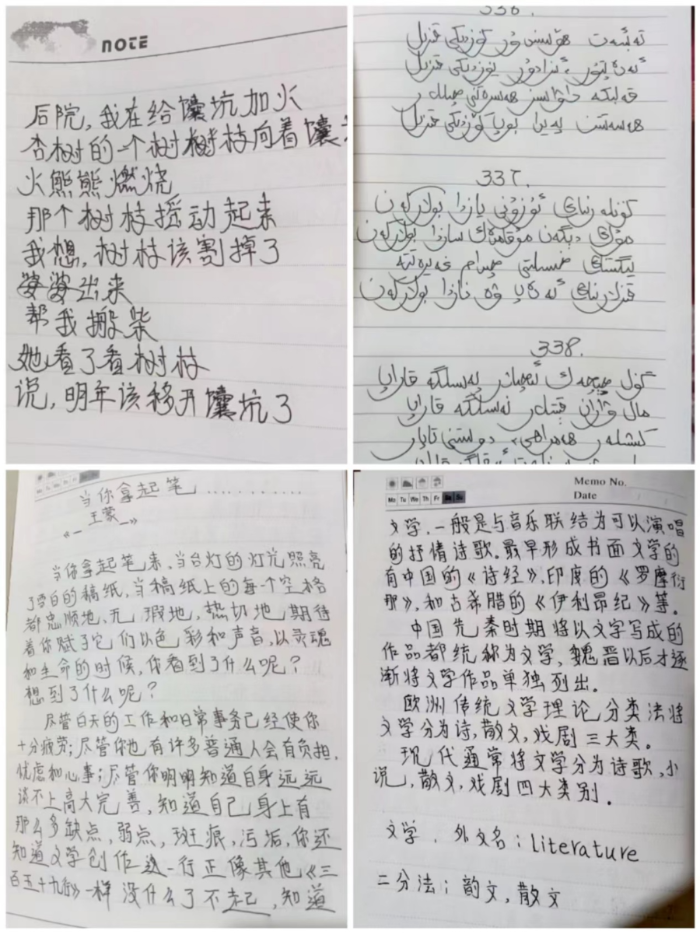Shiliuyun-Xinjiang Daily (Reporter Gao Fang) news: March 21 marks the World Poetry Day. On this date in 2024, at 8:00 p.m., an online live event was hosted by a special column on the Chinese Poetry website. During the event, a short poem titled The Naan Pit and the Apricot Branch was introduced and appreciated by poetry enthusiasts. Its author, Gulsumhan Usman, shared her creative insights, garnering attention and likes from poetry lovers across the country. Here is the content of the poem:
In the backyard, I stoke the fire for the naan pit,
An apricot branch grows bending towards the heat so bold,
The flames leap high, engulfing in their fiery dance,
And that branch starts to sway, caught in the blaze's trance.
I think, "This branch must be cut back," as it seems unwise,
When my mother-in-law steps out, lending her helping hands with the logs,
She glances at the branch, with a soft sigh she advises,
"Next year, we should move the naan pit away from the branch's path.”
Among the 34 comments, Yi Xinyi, a senior Chinese language teacher, commented that this is a short poem with philosophy in its interest. It not only shows the conflict between the naan pit and the apricot branch, but also the difference in the choices between the heroine and her mother-in-law. By placing the conflict and choice in daily details, ordinary life has the light of philosophy and poetry.
Let living plants continue to grow, and those that cannot grow should make way for life. Here, a kind-hearted mother-in-law unintentionally taught the heroine a lesson about life through her actions and words. Her actions are metaphorical, while her words are straightforward. The combination of metaphor and directness makes this short poem cleverly structured and full of interest.

Photo shows Gulsumhan Usman under the apricot tree in her home in Yaer Town, Gaochang District, Turpan City, northwest China’s Xinjiang Uygur Autonomous Region. (Photo provided by Gulsumhan Usman)
Gulsumhan Usman, a 37-year-old mother of three in the Gobi Community of Yaer Town, Gaochang District, Turpan City, northwest China’s Xinjiang Uygur Autonomous Region, lives with her husband and parents-in-law in a neat and spacious farmyard. The eight apricot trees flourishing outside their home bring her immense joy, especially since not every household in Turpan can boast such fruit trees.
After finishing junior high, Gulsumhan stopped schooling to help on the farm due to family circumstances. She has never given up her love for reading and poetry, and she continued writing in her notebooks. In 2011, she published her first prose in the Uygur edition of the Turpan Daily, but her literary work was paused with the birth of her children.

Photo shows Gulsumhan Usman creates at home in Yaer Town, Gaochang District, Turpan City, northwest China’s Xinjiang Uygur Autonomous Region. (Photo provided by Gulsumhan Usman)
"My children are my teachers for learning standard spoken and written Chinese language. They patiently help when I struggle with characters, as I call out from my study," explains Gulsumhan, who uses children’s school materials and her phone to learn and transcribe beloved texts.
One day, Gulsumhan's youngest daughter, who was in kindergarten, said to her, "Mom, I really love ballet, and I want to be a dancer when I grow up." Gulsumhan expressed her support. When the girl inquired about her mother's unrealized aspirations to attend college and study abroad, Gulsumhan replied that their financial circumstances had been a barrier. Upon returning to the house after cooking, Gulsumhan heard her daughter's crying. "Mom, I hope you can do what you love and achieve your dreams one day," her daughter said, prompting tears from Gulsumhan as well.
"That incident had a profound impact on me. I wanted to do something that could prove my capabilities, so as not to disappoint my children," said Gulsumhan.
In August 2019, Gulsumhan presented her poems to the Turpan Literary Magazine office. The deputy editor of the magazine, Turgun Jalaldin was impressed by her shyly submitted work, finding depth and beauty in her pieces. Recognizing her potential despite only having a junior high education, he chose several poems for publication.
After her poems were published, Gulsumhan was greatly encouraged. She frequently sent her poetry to Turgun, who always provided timely feedback. "He is my mentor and guide in literature," said Gulsumhan with gratitude when speaking of Turgun.
Since then, Gulsumhan's literary career has taken off, with over a hundred poems, stories, and prose published in newspapers and magazines.
After being recommended by Turgun, Gulsumhan joined the Turpan Writers Associations and Xinjiang Writers Associations. In April 2023, she was chosen for a two-month training program for cultural development in Xinjiang at the Lu Xun Literary Institute, fulfilling her dream of higher education. "This is the most important event in my life," she stated.
Amidst peers with diverse backgrounds, including PhDs and established writers, Gulsumhan, with the least experience, resolved to be the most diligent student. Often seen engrossed in writing, she playfully responded to curiosity about her work: "I aim to copy Anna Karenina in its entirety."

Photo shows Gulsumhan Usman attends the writers' training program for cultural development in Xinjiang at the Lu Xun Literary Institute. (Photo provided by Gulsumhan Usman)
The Naan Pit and the Apricot Branch, written during her training at the Lu Xun Literary Institute, was her debut in modern poetry using standard spoken and written Chinese language. "Writing modern poetry made me realize that the content and scope of writing can be very broad; I can write about my real life in poetry," she said. Later, she shared 37 poems with teacher Yang Biwei at the Lu Xun Literary Institute nervously. “She recommended my work to the Chinese Poetry website and encouraged me to persist, which greatly motivated me.”

Photo shows poems by Gulsumhan Usman and her notes. (Photo provided by Gulsumhan Usman)
On International Women's Day this year, Gulsumhan learned her poem was featured on the Chinese Poetry website's special column, and she was invited for a related livestreaming. Despite her excitement and nerves about her performance, she spoke confidently about her life and writing. "I am a farmer; writing poetry is my hobby. I work on the farm during the day and take care of my family. Only at night, when it's quiet, do I find time to write. That's when I feel most relaxed and happy..."
"After she came back from the training, she became more confident and made significant progress in her writing. I was initially worried that she would be too nervous during the livestreaming," Turgun said.
That day, Gulsumhan's family watched the livestreaming, and the happiest ones were her children. Her youngest daughter pointed to the magazine where her poem was published and asked, “Mom, when will there be a whole book of poems written by you?” She said, “There will be.”
(A written permission shall be obtained for reprinting, excerpting, copying and mirroring of the contents published on this website. Unauthorized aforementioned act shall be deemed an infringement, of which the actor shall be held accountable under the law.)









